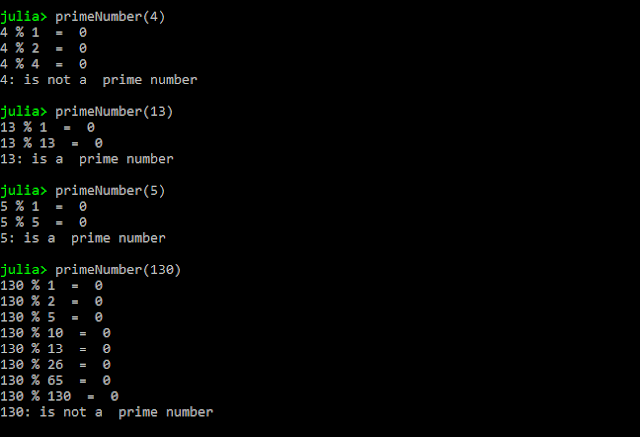Julia Tutorial For Begineers to check if a number is prime number
What is prime number?
A prime number definition is a number which is divided by itself and one is called as prime number . By any other number the prime number cannot be divided and if we try to divide the prime number by any other number between one and the prime number it will not give remainder as zero
Here we write a small program in Julia to check if the number is prime number
In the above program we have define a method called as prime number . In the method "primeNumber(number) " number is a variable and we can reuse the method for any number to check.
function primeNumber(number)
count =0
for j = 1:number
Later we define a counter to increase itself by one when a number is divide by other number and the remainder is zero
In the for loop we are defining the range between one and the prime number specified, the number will be taken from the argument
if number%j == 0
count=count+1
println(number, " % ",j , " = ", number%j)
end
Here we write a if condition to check if the number when divided yields remainder as zero. If the remainder is zero then the counter is increased to one
Now we will see the result by passing a number
function primeNumber(number)
count =0
for j = 1:number
if number%j == 0
count=count+1
println(number, " % ",j , " = ", number%j)
end
end
if(count == 2)
println(number ,": is a prime number")
else
println(number ,": is not a prime number")
end
end
What is prime number?
A prime number definition is a number which is divided by itself and one is called as prime number . By any other number the prime number cannot be divided and if we try to divide the prime number by any other number between one and the prime number it will not give remainder as zero
Here we write a small program in Julia to check if the number is prime number
In the above program we have define a method called as prime number . In the method "primeNumber(number) " number is a variable and we can reuse the method for any number to check.
function primeNumber(number)
count =0
for j = 1:number
Later we define a counter to increase itself by one when a number is divide by other number and the remainder is zero
In the for loop we are defining the range between one and the prime number specified, the number will be taken from the argument
if number%j == 0
count=count+1
println(number, " % ",j , " = ", number%j)
end
Here we write a if condition to check if the number when divided yields remainder as zero. If the remainder is zero then the counter is increased to one
Now we will see the result by passing a number
function primeNumber(number)
count =0
for j = 1:number
if number%j == 0
count=count+1
println(number, " % ",j , " = ", number%j)
end
end
if(count == 2)
println(number ,": is a prime number")
else
println(number ,": is not a prime number")
end
end


Comments
Post a Comment